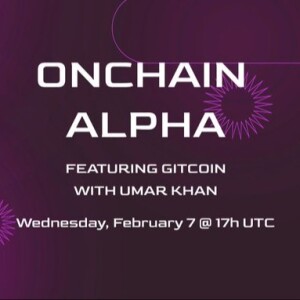
In this episode of Onchain Alpha Humpty speaks with Umar Khan. Umar Khan is a data researcher and analyst building powerful tools to make Gitcoin data more usable and fun.
- Project Socials: https://twitter.com/gitcoin
- Guest Socials: https://twitter.com/umarkhaneth
Summary
In this episode of On Chain Alpha, Humpty and Umar Khan discuss the importance of public goods, region data, and building with public goods data. They delve into Umar's journey into crypto and his role at Gitcoin. They also explore the challenges and opportunities in DAOs, including the need for leadership development. The conversation highlights the future of Gitcoin Grants and the role of open source software and data in the Web3 ecosystem. They also touch on the significance of data distribution and the role of platforms like Dune and Farcaster. In this conversation, Umar Khan discusses the importance of creating collaborative spaces in the Web3 community. He introduces Region Data, a platform that brings together people from various organizations to learn and collaborate. The value of on-chain data is also highlighted, with Umar mentioning the simplicity and widespread use of Proof of Stake (POS) systems. He explains how data labeling as a service, provided by Arkham Intelligence, helps make on-chain data more human-readable and enables the identification of wallet owners. Umar also discusses the role of Gitcoin Passport in civil resistance and its potential applications in universal basic income and airdrops. The conversation concludes with a discussion on Ethereum Account System (EAS) and its use in passport stamps.
Takeaways
Public goods and region data are essential for building a sustainable and regenerative crypto ecosystem.
DAOs provide opportunities for anyone to contribute and participate in the crypto space.
Leadership development is crucial for the long-term success of DAOs.
Gitcoin Grants and the Allo Protocol enable funding for open source software projects.
Open source software and data sharing are key components of the Web3 movement.
Data distribution platforms like Dune and Farcaster facilitate access to valuable data for analysis and insights. Creating collaborative spaces in the Web3 community is crucial for learning and collaboration.
On-chain data, such as Proof of Stake (POS) systems, is valuable and widely used in the Web3 ecosystem.
Data labeling as a service, provided by Arkham Intelligence, helps make on-chain data more human-readable and enables wallet owner identification.
Gitcoin Passport plays a role in civil resistance and has potential applications in universal basic income and airdrops.
Timestamps
00:04 - Introduction to On Chain Alpha
02:45 - Umar's Journey into Crypto and Gitcoin
09:25 - Challenges and Opportunities in DAOs
11:35 - Funding and Leadership in DAOs
23:23 - The Importance of Open Source Software and Data
36:00 - Gitcoin Grants and the Allo Protocol
39:58 - Regen Data and Data Distribution
49:40 - Creating a Collaborative Space for Web3
50:39 - The Value of On-Chain Data
51:19 - Differentiating Humans from Bots
52:47 - The Role of Gitcoin Passport in Civil Resistance
54:12 - Exploring Ethereum Account System (EAS)
54:00 - Using EAS for Passport Stamps
56:29 - Incentivizing Resistance with Tiered Rewards
57:17 - Gamifying Web3 with Tangible Goals
58:08 - Closing Remarks and Where to Find Umar Khan
No comments yet. Be the first to say something!